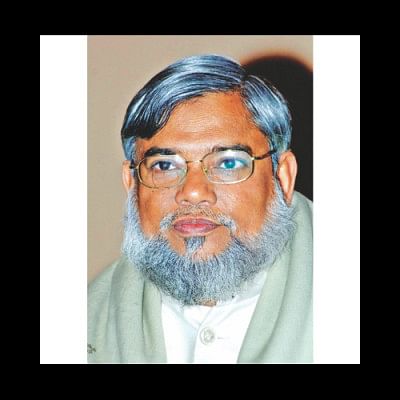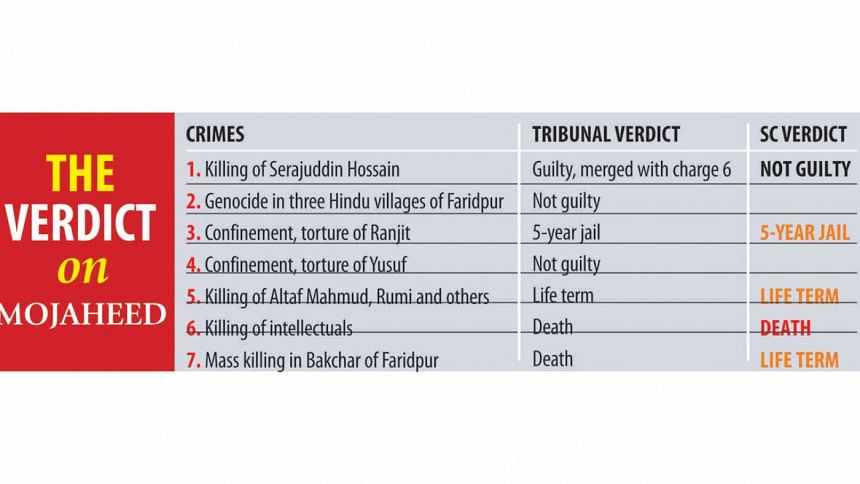SC upholds verdict

The Supreme Court yesterday unanimously upheld the death penalty of Ali Ahsan Mohammad Mojaheed for planning and instigating the killing of intellectuals and professionals at the fag end of the country's Liberation War.
The SC verdict has paved the way for execution of the Jamaat-e-Islami secretary general and also a former minister, originally sentenced to death by a war crimes tribunal two years ago.
During the nine-month bloody war, he was chief of the infamous Al-Badr Bahini, an auxiliary force of the Pakistan occupation army, responsible for abducting, torturing and killing freedom fighters, intellectuals and pro-liberation people.
This is the first time an ex-minister's death sentence for war crimes has been
confirmed by the apex court. Mojaheed is also the first war crimes convict facing gallows for the killing of intellectuals and professionals.
The top court also upheld his life sentence for killing composer Altaf Mahmud, Jahir Uddin Jalal, Badi, Rumi (son of Shaheed Janani Jahanara Imam), Jewel and Azad at the Old MP Hostel at Nakhalpara in Dhaka and his five years' jail term for confining and torturing Ranjit Nath, a civilian, at a Bihari camp in Faridpur.
Mojaheed can now file a review petition and if it is rejected, he can seek presidential clemency as a last option to save his life.
On July 17, 2013, the International Crimes Tribunal-2 found Mojaheed guilty of abducting and killing journalist Serajuddin Hossain. But the court did not give any separate sentence for this, as the offence was merged with those of the killings of intellectuals and professionals, for which the tribunal awarded him the death penalty.
The charge concerning the killing of intellectuals says the Pakistan army set up a camp at Mohammadpur Physical Training Institute in Dhaka where members of Razakar and Al-Badr forces used to train.
In 1971, Mojaheed was president of Islami Chhatra Sangha, the then student wing of Jamaat-e-Islami. After the war broke, the Chhatra Sangha started operating as Al-Badr, the "death squad" of the Pakistan army, the tribunal said.
Mojaheed challenged the tribunal verdict with the SC on August 11, 2013, seeking acquittal on all the five charges against him. The SC concluded hearing of the appeal on May 27 this year.
Yesterday, a four-member SC bench headed by Chief Justice Surendra Kumar Sinha came up with the short verdict, allowing Mojaheed's appeal in part.
The bench acquitted the Jamaat leader on the charge of abducting and killing journalist Serajuddin Hossain but found him guilty of killing intellectuals and professionals and upheld the death sentence given by the tribunal.
The three other judges are Justice Nazmun Ara Sultana, Justice Syed Mahmud Hossain and Justice Hasan Foez Siddique.
Also for the first time in a war crimes case, the SC returned the verdict unanimously. All the three previous appeals that the SC heard saw dissenting verdicts.
Chief Justice SK Sinha delivered the short verdict in a packed courtroom around 9:05am amid tight security in and around the court area.
A few hundred people, including lawyers, journalists, justice-seekers and observers were present in the court. Mojaheed's three sons were also there.
The SC did not clarify the grounds of its sentence. It will be clear once the full text of the judgment is released.
The 67-year-old convict was in Dhaka Central Jail when the court pronounced the verdict. Normally, the accused are not produced before the appeal court.
Jamaat expressed disappointment at the judgment and called a 24-hour hartal starting 6:00am today, demanding the release of Mojaheed and all other party leaders and activists.
State Minister for Home Asaduzzaman Khan Kamal told reporters in Rajshahi that the government would implement the SC verdict on completion of all legal procedures.
Attorney General Mahbubey Alam said the process for executing Mojaheed would start after the release of the full verdict.
But the process will be halted if he files a review petition, which he must do within 15 days from the date of the release of the verdict, the AG told reporters.
Usually, a review appeal is entertained for consideration in case of serious factual mistakes in the verdict or wrongful application of the law, legal experts say.
Mahbubey Alam said the Al-Badr force killed intellectuals, including Dhaka University teachers, eminent physicians and journalists in a pre-planned way just days before the Pakistan army surrendered to the allied forces. The plan was aimed at eliminating all the brightest minds of the soil.
There is no country in the world where intellectuals were killed by their fellowmen, the attorney general said.
During the war, Mojaheed delivered provocative speeches saying books written by Hindu people would not be kept in any public library. He also instigated the Al-Badr force to kill intellectuals, he added.

Defence lawyer Shishir Manir told The Daily Star that Mojaheed would seek a review.
"I am of the view that the prosecution has miserably failed to produce any credible eyewitness to show that Mojaheed was directly involved in commission of offences in 1971," he added.
Mojaheed's son Ali Ahmed Mabrur said, "We did not get justice at the tribunal. We had hoped justice will be done by the Supreme Court but we have been deprived here as well. We are aggrieved."
Mojaheed, who was made a technocrat minister during the BNP-Jamaat-led four-party alliance rule in 2001-2006, came under huge criticism for his audacious comment in 2007 that there were no war criminals in the country.
Also an accused in the sensational August 21 grenade attack case, he was arrested in June 2010 in a case filed for hurting religious sentiment of people. He was shown arrested in a war crimes case in August the same year.
In the three previous war crimes verdicts, the SC handed the death penalty to Abdul Quader Mollah, upheld the death sentence of Muhammad Kamaruzzaman and commuted the maximum punishment of Delawar Hossain Sayedee to imprisonment till death.
Kamaruzzaman was executed on April 11 this year and Quader Mollah on December 12, 2013.
Eight more appeals are now pending before the top court.
The appellants are BNP leader Salauddin Quader Chowdhury, Jamaat chief Motiur Rahman Nizami and party leaders Mir Quashem Ali, ATM Azharul Islam and Abdus Subhan, expelled Awami League leader of Brahmanbaria Mobarak Hossain, former state minister of HM Ershad's regime Syed Mohammad Qaisar and former Jatiya Party lawmaker Abdul Jabbar.

 For all latest news, follow The Daily Star's Google News channel.
For all latest news, follow The Daily Star's Google News channel. 



Comments